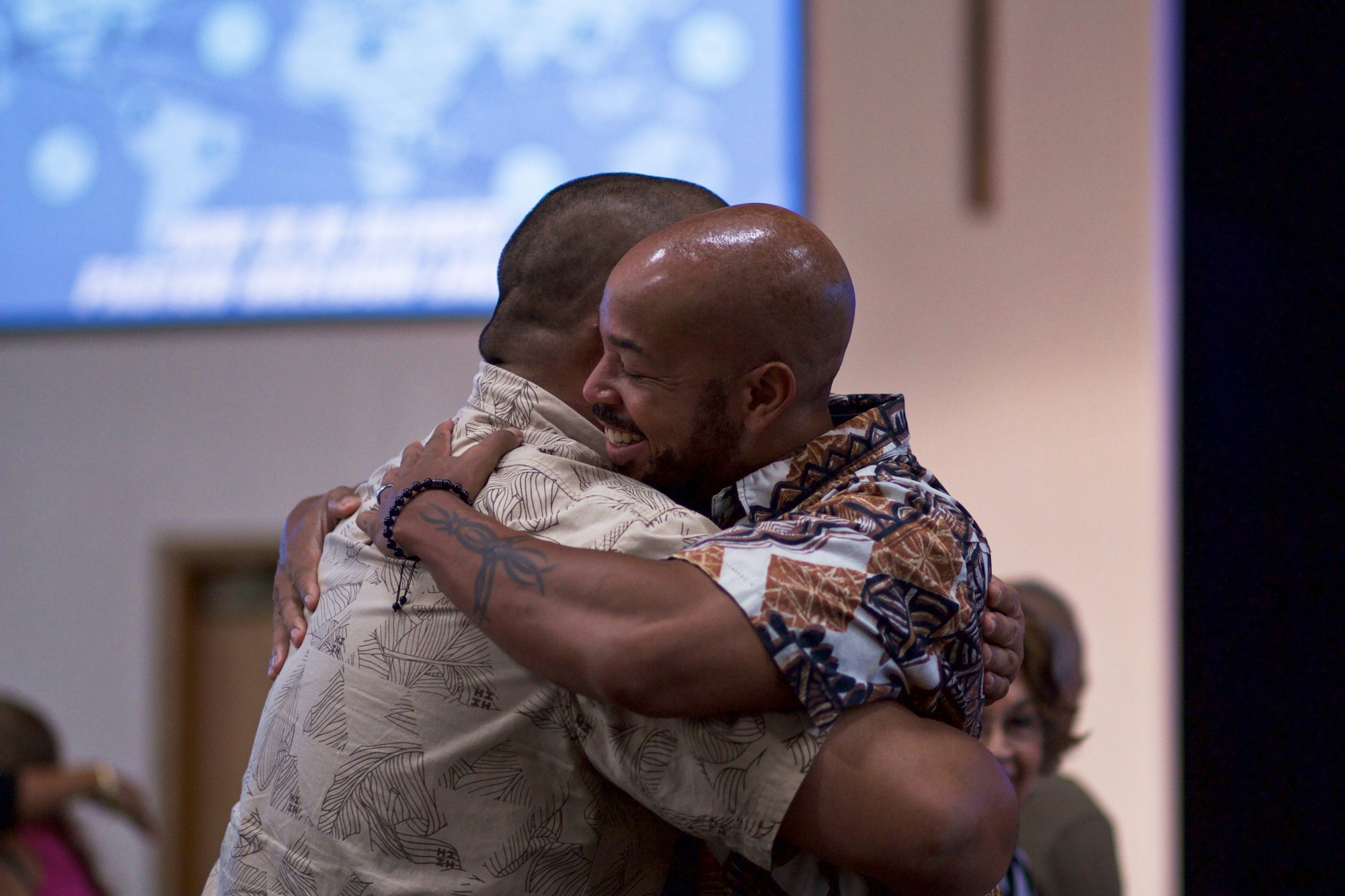Requests vs. Demands: A Key to Honest Relationships

I'll never forget the first time someone I loved offered me the safety of choice.
I'll never forget how it felt.
When I was in high school, one of my best friends, Gbemi (Bim-ee), and I worked together serving tables at a restaurant. I had a car and she didn't yet so sometimes she would ask for a ride. But something threw me in how she made the requests, and how she followed up.
In an even, light, matter-of-fact sort of tone, she'd say...
"Hey Tori, can you give me a ride home today? It's okay if you say no."
When she first started asking for rides this way I'd pause for a second, feeling skeptical and confused. Okay to say no?
Something about that claim didn't feel safe to me at the time. But nothing about Gbemi - and I mean literally nothing - was ever unsafe. Not to me, anyway.
She continued to ask the question exactly the same way. Always adding in the "it's okay if you say no".
I don't remember how long it took me to actually say no, but I do remember feeling nervous and guilty saying it, which was normal for me.
The skepticism stayed in the back of my mind, and the nervousness at trusting her words stayed in my body...
But when the time came I braced for impact. Ready to over-explain my reasoning, I did the courageous thing. I said no.
Her response was seamless and easy. Nothing changed in her tone. It remained light and matter of fact as she simply replied, "Okay thanks for letting me know!" and walked away as if nothing was wrong.
As if it really, genuinely was, okay with her that I said no.
It felt so strange to do all of that bracing for nothing.
For the remainder of our time working together, Gbemi would practice making requests for rides in that same way. A way that gave me an honest choice.
I'd give her rides when I could, and when I couldn't - for any reason including low capacity - I would practice trusting her promise that it was always okay to say no.
Gbemi never wavered. She kept her word. It really was always okay to say no.
Nothing in our friendship ever changed. I felt guilty, but never guilt-tripped. I never felt a grudge or a questioning of my care for her. I never felt that she took it personally.
Gbemi's a human, so I imagine it was disappointing to hear no sometimes because I think we all feel disappointed hearing no sometimes.
But if she ever expressed that disappointment to me, she did so in such a gentle way that I can't recall it. Meaning, she was compassionate and emotionally resourced enough to never make her disappointment my responsibility.
If she shared it with me, it wasn't in a way of handing it to me to fix. She didn't use it to change or manipulate my behavior.
Over time I grew to trust that Gbemi's requests were genuinely requests. I grew to trust that when some people made requests, the answer they were seeking was an honest one. Not a compliant one.
I could say yes. I could say no. I could offer an alternative.
Either way, I could choose. And they would accept the answer.
Gbemi was the first person in my life I recall offering me this kind of freedom in relationship. Where you get to be loved, never punished, never guilt-tripped, pressured, or fought against, for giving an honest "no".
I didn't have the awareness to reflect on it then. But now I know that at a young age, Gbemi was demonstrating a fluent understanding in the difference between requests, and demands.
This understanding is important. And the nuts and bolts of this are what I want to share with you today.
Communicating a Request vs. a Demand
I first read about "Requests Versus Demands" in Marshall B. Rosenberg's book Nonviolent Communication (pg. 79). A fan favorite among my clients and a book I myself am very fond of.
Marshall's work & legacy are about the power of communication. Specifically, its power to initiate & escalate violence and relational ruptures, and its power to deescalate, prevent violence, repair, and choose connection instead.
He explains his take on requests vs. demands through a communication lens beautifully.
I want to invite you to consider your behavior as you read this, as well as how your body and mind receive these behaviors from others:
"Our requests are received as demands when others believe they will be blamed or punished if they do not comply...the most powerful way to communicate a request is to empathize with people when they don't agree to the request.”
In other words, an honest request seeks an honest answer either way. It doesn’t punish or pressure the person into giving a dishonest “yes”. Instead, we’re grateful for an honest no if that’s the outcome.
Special Note: "Pressure" includes acceptance "for now".
Meaning, if you say okay to someone's no now, to turn around later and bring it up as an issue, their nervous system will clock that it was a demand. Not a request. Because it wasn't really okay for them to say no. It's only okay for them to say "yes", and you have been waiting, perhaps even tactfully, for them to comply with the demand. Tact doesn't negate the demand's presence in your relationship.
And what do we do when we receive demands?
In Marshall's words, we "submit or rebel".
Those are the only two options.
With whom do you find yourself submitting and rebelling? Ask your body.
Who do you feel doing the same in your direction?
According to your behavior, where are you seeking truth?
According to your behavior, where are you seeking compliance? This includes when you're trying to convince or persuade someone to do something your way.
What about their behavior?
How does all of this feel, to you?
The Effects of Demands on Our Relationships (And Trust)
In my own words, if we receive a demand, our system will take it as "danger" because of the punitive consequences or pressure of noncompliance.
Even if noncompliance is our honest answer, we're met with the dilemma of stepping outside of our values to submit - which is self abandonment - not safe mentally or emotionally. Or our other option is to give an honest no and face the outside pressure, hurt or harm coming out way - also not safe.
So it makes sense that many of us will do what we always do when we sense danger. We enter fight, flight, freeze, or appease as a way of coping through believing we are the target of the other person's demand.
When someone's behavior to us says - however playfully or innocently - "you must comply, or else", there's no safe option to exercise agency in that. Because our agency is being challenged. Stifled. Fought against.
We notice we feel this when we, say, brace for impact when someone makes a request. Or we may suddenly feel sluggish, finding ourselves yawning, getting irritable, defensive, or flustered.
If you notice your loved ones do this when you make a request, it might be a time to Self reflect on what your behavior is really saying to them when they give you honest responses to your requests.
Because what's almost even more interesting to me, is how demands can single-handedly ruin a felt sense of mutual trust, safety, and reliability in relationships.
Why? Because even when we do appease someone's demands, it won't be because we're honestly feeling aligned with honoring the demand as we would with an honest request.
When we're activated, the parts of our brain that allow us to exercise honest choice are deactivated.
We can't think critically. We cannot make an honest reflection. We can only react to survive the activation and whatever triggered it until we're free from it.
Keep in mind that triggered reactions aren't always explosive. Especially fawn and appease ones. They can be subtle.
So even if we do appease the person by honoring the request, it'll be because we want to make the pressure or punishment of the demand stop hurting or threatening us. It'll be because we feel the threat, or worse. And we're protecting against it.
We're activated and avoiding the pain of mistreatment or danger (including emotional danger and relational rupture) that routinely comes with us having the audacity to exercise an honest sense of agency.
If we don't feel safe to "no", we can't be 100% honest in saying "yes".
And to be perfectly clear, activation can also be a constant thing. Being "triggered" doesn't always happen and disappear in a moment's time after the demand is issued.
Relationships have patterns and dynamics.
If our relationship is characterized by overt demands, covert demands, submission, & rebellion, (which looks like what we commonly call push-pull), we're likely in a state of consistent or near-constant activation. Many of which involve us navigating a series of requests and demands.
Which means we're constantly fighting, flying, freezing, or appeasing in the face of one another's demands.
So if we want an honest "yes", that can only happen if we're making an honest request to begin with, and the other person has a regulated nervous system to think, reflect, and give an honest "yes" from a grounded space.
If it's not an honest request, without any kind of pressure to comply, the "yes" we do get won't be reliably honest either.
The most honest response we can reasonably expect to a dishonest request (a demand), is thereby the pushback of an honest "no".
The exception to this is if your partner or loved one isn't triggered by your demand to begin with. But that's difficult to find in relationships where demands are the go-to pattern of function.
We do find that more often with relationships that are largely consent-based, and demands are fewer and further between. Then we hear people chucking like "no I felt fine to say no. I said yes because this is a big deal to her, that's why she was being demanding about it. I get that."
They feel safe saying "no" because the dynamic supports their overall sense of safety in saying no. It's a safe relationship.
Relationships characterized by demands don't have this exception of reference ("they're being demanding because this one's a big deal and that's oka with me"). It's moreso "they're always demanding and it's never okay for me to say no" which wears on a person over time.
With the exception considered, my point is this:
If we want honest relationships and honest responses, which I believe many of us do, we have to do the work to create a safe environment for honesty to exist.
We have to learn that giving one another room to exercise agency doesn't inherently threaten the connection or relationship.
The person doing the requesting has a lot of power here over the felt sense of safety. How we react to receiving a "no" is huge. Our relationship with rejection itself is a big deal, and it's worthwhile to work on it.
Our work as the one doing the requesting is to accept the vulnerability we're signing up for when we initiate our own risk of receiving an honest "no" - which is what we're doing when we make a request - and accept the disappointment of rejection without catastrophizing the connection.
If I'm aiming to make an honest request, I try to do it like Gbemi:
- Without guilt tripping.
- Without punishing.
- Without protest.
- Without withdrawing empathy, love & connection
- Without applying any kind of pressure whatsoever.
- Without needing them to clean up my emotional mess about the rejection
Further:
- With verbal gratitude for an honest response either way
I don't keep the list in my head btw. This behavior is a natural byproduct of genuinely preferring an honest response to a complying one. Our behavior tends to reflect how we really feel.
Stop for a second and consider how you'd feel if your relationships were characterized by honest requests instead of demands?
How would your nervous system feel?
Would you feel safer to say no? To receive no?
And equally as important, would you feel safer to trust when someone else told you yes? A huge underlying benefit here I don't want to go unnoticed.
Would you be able to trust yourself to offer honest "yesses" as well?
If you realize now that your relationships are built on demands instead of genuine requests, this is something I help my clients with every day.
Relationships take two, but your side holds a lot of influence. We can figure out the contribution you make, and build a new one that reshapes your relationships into something that feels safe and honest, even when an uncomfortable "No" is in the room.
Some Grace & Intention for the Demanding
Before Gbemi, I didn't know what it felt like to have a safe space to say "no". I also didn't know how to give anyone else that safety.
Like many of you reading this I grew up in a codependent, demanding, and boundary-less sort of household and I generally existed in that side of the world outside of the household for a while.
Gbemi was unique to me, as was my friendship with her.
I would "peer pressure" and "demand" with the best of them, even long after Gbemi showed me what that safety felt like. I had a lot of work and growing to do before I became aware enough, resourced enough, and confident enough, to give others the same safety she was able to offer me so easily.
I have grace for how I was back then, and how many, many people are still consistently demanding now, because I understand that we use demands as a way to get our needs met. We specifically become demanding to get our needs met when we feel otherwise powerless to do so.
More on that here:

Needs aren't wants. This includes emotional needs, like feeling connected to people and experiences outside of ourselves, or having a sense of meaning in outlives.
Our needs affect our survival. Including needs of social safety, security, and support.
Demanding behavior isn't a sign of foul character. It usually comes about when we're not well-resourced enough in other strategies to get our needs met.
If this applies to you, it is your responsibility to change that and figure out safer ways to get your needs met that don't require being demanding.
But I do see the innocence in how the dominance of demanding has become a go-to strategy for getting these needs met when that's all we know.
We feel helpless.
So it can help to understand that there's power in being resourced enough to accept someone's "No".
The Power & Accountability of Acceptance
There's a mountain of power that comes with accepting an honest "no".
For starters, our ability to accept someone's no demonstrates our ability to resource ourselves.
Gbemi was resourced enough to find other ways to get home is a great example. Even if those ways were less favorable (otherwise why would she ask me?) she believed in her ability to make it home safely.
If she was concerned for her safety to get herself home, I would hope she would be a little more demanding or let me know that (yes, there are times when it's okay to be demanding, which I'll get into in a bit), but that never happened that I can recall.
Being able to accept my "no" was a demonstration of Gbemi's sense of self empowerment as a teenager.
Another point of power is that being able to truly accept someone's no implies an "I'm not going to ask again because I'm not going to pressure you." Which also puts the other person in a position of personal accountability.
It challenges them to mean the "no" when they issue it to you.
For example.
What if I wanted to give Gbemi a ride home and I said no anyway?
Her not pressuring me or asking again meant that I would have to take ownership of the fact that I gave a dishonest no without thinking it through, perhaps make up for that, and be more mindful moving forward.
Applying this to more relevant situations:
If I ask a dismissive avoidant who I'm hitting it off with if they're seeking emotional intimacy in relationship, and they say no, I have to be resourced enough to truly accept their no.
Meaning - I know what my standards are and I'm willing to go elsewhere for the kind of relationship I need.
So, and I want you to read my statement below with the energy of someone who truly believes and accepts their "no", please, not as one of those manipulative ploys to get someone to change their mind later:
"Oh okay! It's not for everyone I get it. I'm looking for something different though. Maybe we're better off as friends, you're still cool with me." and make a clean break in the romantic department early on.
Likely surprised, this puts their nervous system in a safe enough space to reflect on if they really meant what they said. I didn't judge them or push back. I didn't even kick them out of my life. In a way, I accepted them as they were, and offered to position them in my life accordingly in a way that would allow them to be exactly that.
I truly accepted and trusted their answer. I won't be asking again and I won't be waiting around for them to change their mind.
Now that they don't have to expect me to change their mind or make the environment less safe to say no, their nervous system senses safety.
The onus is on them to see how they feel about my acceptance, reflect, and approach me now if they do change their mind, and hope I'm still open to that with them, which - honestly - I probably won't be.
Because again, I'm well-resourced in this department. Plenty of people are looking for emotionally intimate relationships. There's literally zero reason I should need to settle and now I would be curious about whether they're being honest with themselves or not in changing their mind. That matters to me. Because when I said I preferred an honest no, I meant that.
Chances are, this would just be a lesson for them. A day in the life of practicing consent-based relationship for me.
Because my acceptance of their no wasn't a submission to a silent demand I inferred that said for me to not have my needs met to pursue a romantic relationship with them.
Literally no one has the power to get me to comply to that but me. I prefer not to.
So I'm leaving the romantic relationship with them to find one that meets my needs. They won't be punished for saying no to a relationship dynamic they're not open to. I'm grateful for their honesty.
I also won't punish myself by pursuing a relationship that I know, going in, would be designed to feel neglectful and lonely for me. I know I need a relationship where reaches for intimacy are mutual and consistent. This is a need for me, not a preference.
My only demand is for me to place myself in a romantic environment where that need is being met. Finding the person who can do that with me is my responsibility. No one else's.
Their only responsibility was to be honest with me about where they fit in that. And they were, which I'm grateful for. It helps us make a clean break.
That whole situation could've been much more difficult and drawn out for us both. They helped saved us time and energy and turmoil. As am I, by remaining empowered in my sense of acceptance for their no.
I hope this is making sense and you're seeing the power in accepting peoples' no's.
But I also want to be clear about something else...
Though I do see the impact of my growth in my relationships and now feel comforted by being told no, because it lets me know my people feel safe to tell me no to begin with which is a good sign that I'm also getting honest "yesses" from them...
I'm still not above getting demanding. And I don't see all demands as inherently bad or harmful.
This conversation, like all of them, has nuance.
Like the example earlier where I said if Gbemi ever felt unsafe getting home, I would hope that she would be more demanding or let me know that was the situation. That would've been worthy cause for me to make an exception to the boundary on my end (boundaries are flexible where needed).
I'm a big fan of demands being used where immediate safety is concerned. They become really functional and help us be heard, especially when we've made a good practice of not being demanding.
A usually respectful mother who's teaching her child boundaries suddenly screaming "STOP" at her child running toward a street is almost guaranteed to get life-saving compliance from that child. Even - and especially when - she rarely yells or makes demands otherwise.
Her usual respect and gentle dynamic with her child means the demand will be heard as a "must" when safety is concerned.
This is a healthy use of demands. My loved ones will tell you I get very demanding where I'm perceiving safety as an issue. I also get demanding when I'm doing all the work I can to honor and enforce my boundaries and someone keeps finding ways to sabotage me honoring my own damn boundaries. Good luck to you trying to get me to comply quietly.
Sometimes demands are okay.
But I take "no" with ease at almost all times outside of that. And I enjoy that space.
My balance isn't everyone's balance, though.
So it's worth asking for yourself what things you're okay demanding, and what things you'd rather request. It's worth going at this intentionally.
But the big, audacious goal to strike a healthy balance between requests vs. demands in relationships, I think, is this:
If our overall relational dynamics (and the way we feel in them) are characterized by honest requests and consent, not demands and compliance, we're likely participating in honest, truthful relationships with people.
Meaning, on the day to day, we each feel safe to make honest choices, and voice those choices as honestly without fear of repercussion. And sometimes, we can get a little demanding about the things that really matter to us.
Think 80-20. 80% consent-based, and 20% demanding where it really counts.
This is a standard I actively nurture in every relationship I have. It is a dynamic I actively hold myself accountable to co-creating, even (and especially) when I really, really want something I'm not going to get.
This largely shows up as "I want this from you, but I don't need this from you, so it's okay if you say no" energy, at least 80% of the time.
Practice that.
Rooting For You,
Tori
Related Reading:












Member discussion